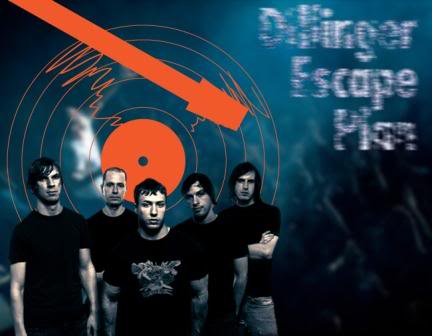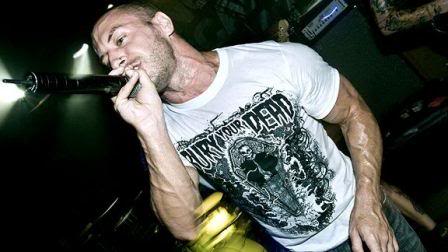|
By: Arika Kaosa
|
|
The Dillinger Escape Plan is known for their insane live shows and their musical technicality. After a brief issue with losing a drummer, the band
is back with their new album, "Option Paralysis". I had the chance to sit down with the bands singer Greg at Warped Tour and chat about everything
currently going on with the group.
|
Punk Globe: Dillinger is obviously on Warped Tour right now and then after this you'll be going to Europe and the UK?
Greg Puciato: Yeah we'll be taking a month and a half off and then we'll go to Europe and the UK and some places we've never been like Greece and
Israel. So it's gonna be really cool.
PG: I saw that you guys will be in Israel.
GP: It's pretty rad.
PG: They have a really good heavy music scene over there.
GP: We've been getting a lot of people from over there messaging us and there's even a Facebook group that's called, "Bring Dillinger to Israel".
There's around 700 members and all the writing on the wall is in Hebrew. That's when I really realized that maybe this isn't such a gamble and it
actually seems like there's a scene here. I'd assume because they're in the midst of such aggression over there in general, like the middle east,
that aggressive music does pretty well I guess.
PG: Dillinger played Coachella as well.
GP: We did, it was insane. It was really, really weird. We played Bonaroo last year and Coachella this year and both of those were instances where
I thought we were going to be the odd duck and no one's gonna be here and it's gonna be like crickets after every song. It was really overwhelming
how many Dillinger fans were there and the cool thing was no one left. It only got bigger as we were playing and it was really cool especially in
hipster central, which is Coachella. It's like if they don't have synthesizers on stage then I'm out of here.
GP: I prefer playing at nighttime. It really doesn't matter if it's outside or inside, I just really do not like playing in the day. There's
something about the daytime that doesn't feel rock n roll. To me you're supposed to wait until nighttime because there's a whole different vibe.
I do think this is cool; I don't dislike being on the tour. Of course there were things that were different that we had to get used to like playing
a different time everyday, having to play outside, having it be hot as hell, only playing 30 minutes, and not playing to our audience. There were
a million things that were really odd for us at first but it's good because it's taking us out of our comfort zone and it's really making us stronger.
PG: Yeah there's so many different fans here that you could gain. The band released the new album, "Option Paralysis", everything still going well
with that? I heard it was a really hard record to write.
GP: It's funny, it really was. It wasn't musically, I think it was the easiest music we've ever done. We were all actually getting along and we
wrote it in the quickest time we've ever wrote a record. It was just a very organic record. Billy and Ben, the guitar player and drummer lived
together. In the past, it was always Ben and Chris would have practice days because they didn't like one another at all. So they would be able to
practice for a few hours and they would get whatever they could out of it and then be like ok I gotta get going. This time they lived together and
all day long treated it like a job in a way. So they took every creative avenue they could possibly take and didn't leave any stone unturned so I
think that made it a more organic process. It wasn't ok that part is done, ok I can't take you anymore, I'm out of here. Lyrically, I was going
through at the time---I usually don't write lyrics until close to recording because in a way it's more of a time stamp. I don't want to have lyrics
from a year ago and try to figure out what they meant and how they're relevant now. If you're gonna sing about something and put it on tape or on a
hard drive or whatever, I feel like it should mean something to you as you're saying it. I wait until, not the last minute, but when things are kind
of close to recording. I was just in a really weird time in my life while I was writing the lyrics and it was very difficult not just to write but
to realize that while I was writing it was impossible for me to separate what was going on in my writing to what was going on in my life. It was a
really hard thing for me to do. You probably couldn't tell but everyone who knew me like our producer and everyone in the band was like, "Woah, this
is pretty heavy. Do you really want put this stuff down?" I feel like as an artist you have to put yourself in a raw position.
PG: You do otherwise it gives off this fake fašade.
GP: Right! You shouldn't write happy songs if you're not ecstatic. You shouldn't write depressing songs if you're not ready to kill yourself.
You have to be extreme because the only way someone else is going to get anything out of it is if you are in an extreme place.
PG: Well, it's always the extreme artists that make good art.
GP: I agree. I think even moderately stimulating art came from an extreme place. If it came from a moderate place it's going to mean nothing.
PG: The band has it's own label. Is it every single person in the band or is it just a single person who runs it.
GP: It's not so much a label as it is an umbrella. Basically, it operates differently from a business standpoint. We don't have any interest in
releasing other bands records. It gives us some rights from a business standpoint that we wouldn't have without it. We don't have distribution;
we have no means of releasing a CD. We still need someone on the back end to handle that part. We got out of a 10-year contract and we wanted to
have something that we could take to any label now and be like we have this Party Smasher Inc., and no matter who is backing us that's the thing
that it's under and that way if we end up on Epitaph or we end up on Season's Mist or Metal Blade, we still have some more legal rights. It also
keeps a string of continuity so people aren't like who is there, where are they going? We have some type of thing behind it. It's just a way for
us to keep more creative control and financial control over our lives.
GP: Was it at The Vic with AFI ?
PG: It was.
GP: That's crazy. I remember that pretty good!
PG: It was so weird but it was so awesome because you had Nightmare of You opening and everybody was falling asleep. Then Dillinger
played and woke everybody up and then AFI played.
GP: That's funny. That was the tour that we kind of had issues with after that. We lost our drummer and that was like the final blow up tour.
PG: Didn't you throw your mic stand out into the crowd and break some chick's nose?
GP: I don't have any idea. I've got sued so many times on that tour I don't even know what's real and what's not. I mean, you don't find
out about it until like six months later. People will say, "Hey you kicked me in the face on stage six months ago" and it's like what are
you talking about? I can't believe that was four years ago!
PG: Neither can I!
|
|
|


